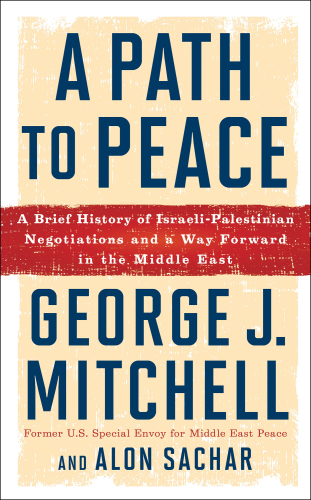
A Path to Peace
A Brief History of Israeli-Palestinian Negotiations and a Way Forward in the Middle East
کتاب های مرتبط
- اطلاعات
- نقد و بررسی
- دیدگاه کاربران
نقد و بررسی

October 3, 2016
This admirably concise summary of decades of Palestinian-Israeli conflict and the many futile attempts at diplomatic resolution provides some context to the current impasse and the United States’ role in keeping negotiations going. Mitchell (The Negotiator), a former U.S. senator who served as Special Envoy for Middle East Peace from 2009 to 2011, rarely strays from the bland language of political process, but nonetheless provides a valuably high-level perspective. His points often seem obvious: “History has shown that real breakthroughs between Israelis and Arabs occur only when the parties themselves realize that the cost of continued conflict outweighs the risk of an agreement.” Yet amid his summaries of seemingly endless negotiations, his message—that both parties are likely to eventually take “the painful and politically difficult steps” needed for a two-state solution—remains constant. The brisk narration of events from Israel’s founding up to the efforts of George W. Bush’s administration gets more detailed and slightly more critical when Mitchell covers his own time as an envoy for President Obama. Mitchell’s careful statements may simply seem inconclusive to the more casual reader, but this is only a testament to the level of nuance in this scrupulous book. Agent: Deborah Schneider, Gelfman Schneider/ICM Partners.

September 15, 2016
A former U.S. senator and diplomatic negotiator considers the history of Palestinian-Israeli diplomacy over three-plus decades and what prospects for peace still exist.Is a two-state solution still viable or a one-state undemocratic solution the grudging alternative? Mitchell (The Negotiator, 2015, etc.) is a revered, longtime peace negotiator and "special envoy" (in Northern Ireland and in Israel) and recipient of the Presidential Medal of Freedom (1999), and his co-author, Sachar, is a high-level State Department official with years of experience with the Middle East. As a diplomat, Mitchell has good manners and does not attack either side, though he is realistic in his historical assessment while still representing the pro-Israel U.S. His analysis of peace negotiations begins with the founding of the state of Israel and the "special relationship" the U.S. engendered by President Harry Truman's recognition of the founding "just eleven minutes after their 1948 declaration of independence." The American arming of Israel during the Cold War has been key in its ability to resist attack by its Arab neighbors, who were often supported by the Soviet Union, yet the U.S. also sold arms to Arab states, such as Jordan. The U.S. has vociferously denounced Israel's "unrealistic vision of greater Israel" and pushed for "land for peace" concessions, while in 2002, George W. Bush "became the first U.S. president to make the establishment of a viable Palestinian state an explicit foreign policy objective." Mitchell tiptoes through the various (failed) peace negotiations, from Camp David to Madrid to Oslo to Annapolis, and the Israeli political turnover, which has greatly affected the prospects for peace. Moreover, the author is stern regarding the Palestinian National Authority leadership, the corruption under Yasser Arafat, and the strong-armed disarray under current president Mahmoud Abbas. Mitchell is careful not to ruffle too many feathers in his analysis, but many readers will wonder if officials on either side will follow his proposals.
COPYRIGHT(2016) Kirkus Reviews, ALL RIGHTS RESERVED.

June 15, 2016
Former Senate Majority Leader Mitchell was crucial to brokering the 1998 Good Friday Agreement that led to peace in Northern Ireland. But as U.S. Special Envoy for Middle East Peace from 2009 to 2011, where he focused on resolving the Israeli-Palestinian conflict, he was not so successful. Here, with an insider's insight, he chronicles Israeli-Palestinian negotiations through the years and lays out the concessions he believes both sides must make if peace is ever to be achieved.
Copyright 2016 Library Journal, LLC Used with permission.

























دیدگاه کاربران